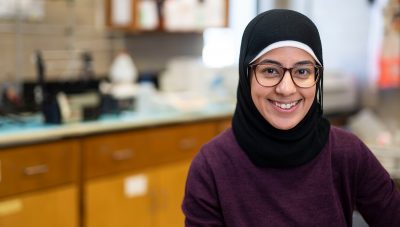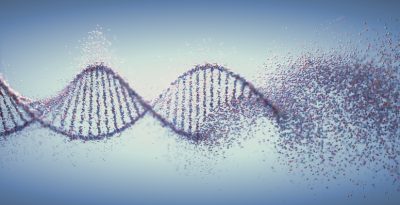Past Event! Note: this event has already taken place.
| When: | Wednesday, February 10th, 2021 |
| Time: | 1:30 pm — 2:30 pm |
| Location: | Zoom Webinar |
| Audience: | Anyone |
| Contact: | Jessie Cartwright, Outreach and Community Engagement Officer, jessie.cartwright@carleton.ca |
About the Speaker

Hanane Hadj-Moussa is a Biology PhD Candidate at Carleton University
Hanane Hadj-Moussa is a Biology PhD Candidate in Dr. Ken Storey’s lab at Carleton University. Her work investigates the molecular tools that animals use to drop their metabolism and survive extreme environments such as freezing cold temperatures and oxygen deprivation. She is currently studying the global metabolic and microRNA strategies that lemurs use to hibernate and that naked mole-rats use to endure low oxygen environments. Hanane currently holds an NSERC Post-Graduate scholarship and has co-authored over 20 peer-reviewed scientific publications.
MicroRNA: Can We Use Natural Gene Silencers to Solve Human Problems?
 Our body relies on the coordination of thousands of molecules to regulate virtually all biological functions, with microRNAs emerging as a ‘master controller’. MicroRNAs are short RNAs which do not become proteins, but instead act as genetic ‘on-off’ switches capable of quickly reorganizing metabolic systems. Recent work from our lab on animals that drop their metabolism to survive extreme environments (such as hibernating lemurs and frogs that freeze solid) has identified microRNAs as key tools to both facilitate reductions in energy usage and activate defenses needed for basic survival. What we have found is that many of the same microRNAs are altered in human cancers, neurodegenerative diseases, and stroke. By applying the insights we are learning from nature, we can explore the possibility of using RNA-based interventions to treat diseases, as well as solve other problems. Think turning off human donor-organs to help preserve them during organ transplants, or maybe even inducing suspended animation to help astronauts on long space flights.
Our body relies on the coordination of thousands of molecules to regulate virtually all biological functions, with microRNAs emerging as a ‘master controller’. MicroRNAs are short RNAs which do not become proteins, but instead act as genetic ‘on-off’ switches capable of quickly reorganizing metabolic systems. Recent work from our lab on animals that drop their metabolism to survive extreme environments (such as hibernating lemurs and frogs that freeze solid) has identified microRNAs as key tools to both facilitate reductions in energy usage and activate defenses needed for basic survival. What we have found is that many of the same microRNAs are altered in human cancers, neurodegenerative diseases, and stroke. By applying the insights we are learning from nature, we can explore the possibility of using RNA-based interventions to treat diseases, as well as solve other problems. Think turning off human donor-organs to help preserve them during organ transplants, or maybe even inducing suspended animation to help astronauts on long space flights.
About the Science Café
Come and virtually join us for a lively discussion around a scientific issue of the day. Be prepared to be informed, engaged and even amused, as our professors share their scientific discoveries with you. All are welcome. For more information, please contact the Faculty of Science by email at odscience@carleton.ca